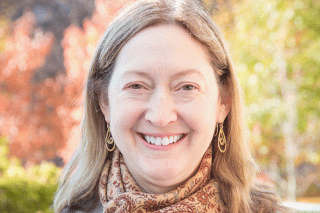Professor and Dean Emerita Michele Cloonan’s book, The Monumental Challenge of Preservation: The Past in a Volatile World, received the University of Mary Washington Historic Preservation Book Prize for 2019. As such, she follows in some esteemed footsteps.
“The first award-winner for this prize was the scholar who has influenced me the most,” said Cloonan. Historian and geographer David Lowenthal received the 1989 award for his book, The Past is a Foreign Country. “The book really turned around my thinking about preservation.”
She started out as a book conservator, “treating objects at the bench; you can’t get more specialized and focused than that!” She wrote her dissertation on paper bindings and became interested in how people used their books.
“Book historians assumed that people would dispose of these so-called temporary bindings and have them replaced with more ‘permanent’ leather bindings. Yet so many of these 17th- and 18th- century paper bindings have survived that I wanted to understand why. There were many answers, such as affordability, but some came down to use. For example, it was easier to play music from scores with light and flexible bindings.”
Cloonan began to think about the political and cultural aspects of preservation as she read Lowenthal’s book.
“He examined the role of preservation in history, and he popularized heritage studies. It all came together for me that there were major issues in the background that we tend not to think about,” explained Cloonan.
In more recent years, Lowenthal wrote about the environment, which further informed Cloonan’s interest in the “bigger picture” of preservation.
“There needs to be more work done professionally to bring the conservation and preservation disciplines together,” she said. “The environmental movement is directly related to preservation in libraries, archives, and museums. With global warming, our natural and built environments are at risk.”
As for preserving our personal digital lives, Cloonan recommends a thoughtful approach: “Preservation takes active management. Many institutions can undertake such management, but how about individuals?”
Cloonan notes what one of her former doctoral students, Vanessa Reyes '16PhD, found when conducting focus groups on preserving personal photos and other artifacts: “People assume that someone else is preserving their stuff for them. If they put their photos on Facebook—Facebook must be preserving them! The images will be there forever! And there isn’t much of an understanding about what it means to preserve something in the cloud. Many people assume that there is some great infrastructure in the digital sky. They don’t understand that major corporations place profits before preservation. There is a major public policy dimension to this, otherwise we are at risk of losing so much of our heritage.”
Cloonan encourages students to become knowledgeable about digital preservation issues, and also to understand how information is created and used in cultural heritage institutions.
“There is a division in some university libraries where ‘traditional’ preservation is separate from digital stewardship. Students need to recognize the importance of preserving all of our collections: paper-based, audiovisual, and digital. We still have hundreds of millions of books in libraries in this country alone, and we need to preserve legacy and digital collections,” urged Cloonan.
As a winner of the Book Prize, Cloonan presented at Mary Washington University on October 17.

